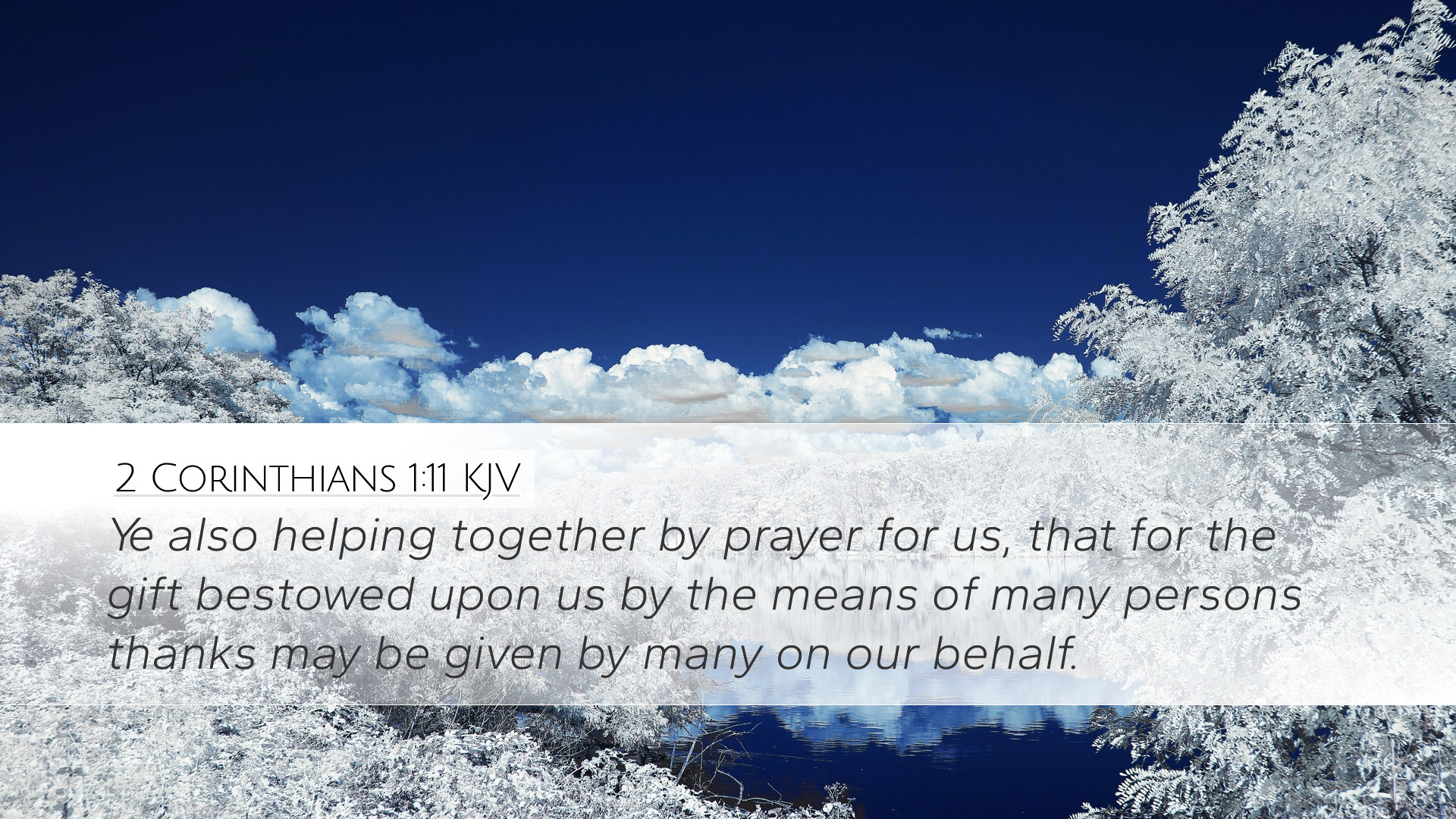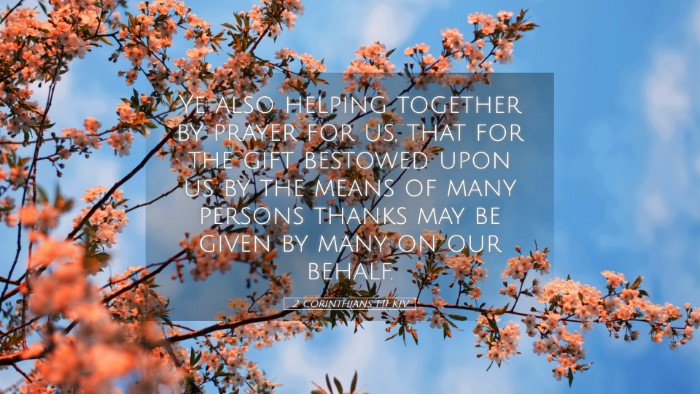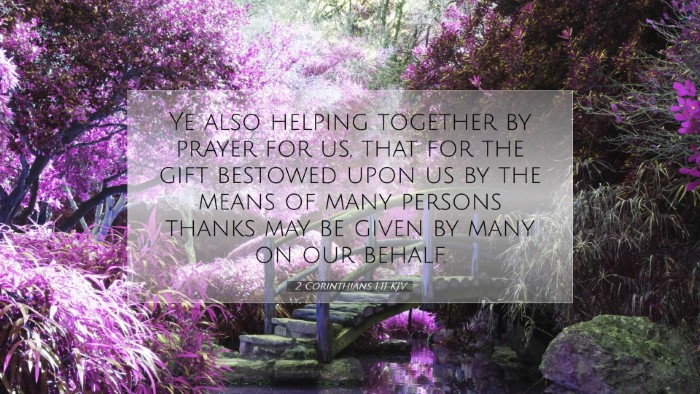Commentary on 2 Corinthians 1:11
Bible Verse: 2 Corinthians 1:11 - "You also must help us by prayer, so that many will give thanks on our behalf for the blessings granted us through the prayers of many."
Introduction
This passage from 2 Corinthians serves as a poignant reminder of the importance of prayer within the Christian community. The Apostle Paul emphasizes not only the necessity of prayer for his own ministry but also the collective participation of the church in this vital aspect of spiritual life. In examining this verse, insights from the commentaries of Matthew Henry, Albert Barnes, and Adam Clarke are synthesized to provide a deeper understanding of its implications for believers today.
Contextual Background
Paul, in his second letter to the Corinthians, is addressing a church that has experienced considerable strife and conflict. The Apostle seeks to reaffirm his apostleship and to encourage the believers in Corinth to support one another spiritually. Much of the letter is dedicated to discussing comfort in tribulation and the nature of Christian fellowship. This specific verse articulates a call to communal prayer, underscoring its role in both personal strength and communal gratitude.
The Importance of Prayer
Matthew Henry highlights that Paul's appeal for prayer is not merely for himself but also for the entire community of believers. He asserts that prayer is a vital ministry where the Church collectively intercedes for one another, thus participating in each other's spiritual battles. Paul sees prayer as a way to enlist divine favor and recognition of God’s sovereignty over their circumstances.
Albert Barnes expounds on the theme of mutual assistance that prayer embodies. He argues that prayer unites the hearts of believers, drawing them closer not only to God but also to one another. This scriptural call for prayer demonstrates that no believer stands alone; rather, we are interconnected as members of the body of Christ. The Greek word translated as "help" (συνεργὴ) suggests a cooperative effort, indicating that while Paul is calling for prayer, he is inviting the church to participate actively in the ministry of the Gospel.
Adam Clarke elaborates on the notion of prayer being a channel for blessings. In Clarke's view, prayer is not merely a ritual but a dynamic communication with God that avails much. He emphasizes that it is through the prayers of many that rich blessings are conveyed, and thanksgiving is generated, forming a shared experience of grace among the community. This interdependence is crucial as it reinforces the biblical teaching that believers share joy and sorrow, contributing to the holistic experience of faith.
The Role of Thanksgiving
Paul’s mention of thanksgiving in relation to prayer illuminates a theological principle: the acknowledgment of God’s provision and mercy through collective intercession. Matthew Henry notes that gratitude in response to answered prayers nurtures a spirit of praise within the community. When believers pray and witness God’s faithfulness, it compels them to express their thanks publicly, fostering a culture of appreciation within the church.
Albert Barnes further reinforces that thanksgiving is not an isolated act but a communal response. He asserts that when one person experiences God’s favor through prayer, it creates a ripple effect—a testimony that encourages others and promotes unity within the body of Christ. This public acknowledgment of God’s blessings functions as an evangelistic tool, demonstrating to the world the active presence of God in their lives.
Adam Clarke emphasizes that the result of prayer and thanksgiving is a testament to the effectiveness of divine intervention. Clarke argues that when believers share testimonies of answered prayers, it fortifies their faith and inspires others to trust in God’s providence. The act of thanking God together after such intercession serves as a communal celebration of faith, highlighting the goodness of God that is experienced in everyday life.
Practical Applications for Believers
In light of this verse, several practical applications can be drawn that are significant for pastors, students, theologians, and Bible scholars:
- Community Engagement: Churches should prioritize prayer meetings and opportunities for collective intercession, fostering a culture of unity and shared burdens.
- Teaching on Prayer: Pastors should provide teaching and resources on the dynamics of prayer, emphasizing its communal aspect and the strength it can provide in both personal and corporate contexts.
- Sharing Testimonies: Encouraging congregants to share their personal experiences of answered prayers can serve to build faith within the body and glorify God publicly.
- Developing a Prayer Strategy: Establishing a prayer team that focuses on intercessory prayer for church needs, local missions, and global outreach can energize the entire church community.
Conclusion
2 Corinthians 1:11 serves as a powerful reminder of the vital role that prayer plays within the life of the Church. Drawing insights from public domain commentaries, we see that Paul’s request for prayer reflects a deeper theological truth: that as believers, we are called to support one another through prayer, thereby experiencing the blessings of God collectively. By fostering a culture of prayer and thanksgiving, the Church not only strengthens its internal bonds but also serves as a testimony of God’s faithfulness to the world.


